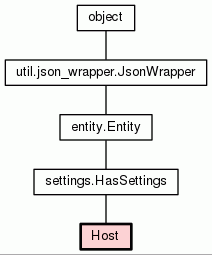The definition of a host can be modified by the user, however
operations may have to be undergone on host's instance: changes
are queued and are being processed by ComodIT. As long as changes are
pending, host's instance does not yet meet the new definition.
Another reason for which a host's instance does comply with the
definition of ComodIT is the modification on the host's instance of
resources managed by ComodIT, for example the deletion of an
application's file. In this case, a compliance error is associated to the host.
|
|
add_application(self,
app_name)
Adds an application to install on this host. |
|
|
|
InstanceCollection
|
instance(self)
Instantiates host's instance collection. |
|
|
|
Instance
|
|
|
Instance
|
provision(self)
Triggers host's provisioning. |
|
|
|
string
|
render_app_file(self,
app_name,
file_name)
Fetches the rendered version of an application's file. |
|
|
|
string
|
render_dist_file(self,
file_name)
Fetches the rendered version of a distribution's file. |
|
|
|
string
|
render_plat_file(self,
file_name)
Fetches the rendered version of a platform's file. |
|
|
|
string
|
get_app_link(self,
app_name,
file_name,
short=False)
Requests a one-time URL for a rendered application file. |
|
|
|
string
|
get_dist_link(self,
file_name,
short=False)
Requests a one-time URL for a rendered distribution file. |
|
|
|
string
|
get_plat_link(self,
file_name,
short=False)
Requests a one-time URL for a rendered platform file. |
|
|
|
Host
|
clone(self)
Requests the cloning of remote host. |
|
|
|
ApplicationContextCollection
|
applications(self)
Instantiates application contexts collection. |
|
|
|
ApplicationContext
|
|
|
PlatformContextCollection
|
platform(self)
Instantiates platform context collection. |
|
|
|
PlatformContext
|
get_platform(self)
Fetches the platform context from server. |
|
|
|
DistributionContextCollection
|
distribution(self)
Instantiates distribution context collection. |
|
|
|
DistributionContext
|
|
|
ChangeCollection
|
changes(self)
Instantiates changes collection. |
|
|
|
Change
|
get_change(self,
num)
Fetches a change from server. |
|
|
|
AuditLogCollection
|
audit_logs(self)
Instantiates audit logs collection. |
|
|
|
ComplianceCollection
|
compliance(self)
Instantiates compliance errors collection. |
|
|
|
ComplianceError
|
|
|
|
live_update_file(self,
app_name,
file_name)
Requests the update of a file on provisioned machine. |
|
|
|
|
live_restart_service(self,
app_name,
svc_name)
Requests the restart of a service on provisioned machine. |
|
|
|
|
live_update_service(self,
app_name,
svc_name)
Requests the update of a service on provisioned machine. |
|
|
|
|
|
|
|
|
|
|
live_install_package(self,
app_name,
pkg_name)
Requests the (re-)installation of a package on provisioned machine. |
|
|
|
|
install(self,
name,
settings={})
Installs an application on this host. |
|
|
|
|
uninstall(self,
name)
Uninstalls an application from this host. |
|
|
|
|
wait_for_state(self,
state,
time_out=0)
Waits until host has requested state. |
|
|
|
|
|
|
Inherited from settings.HasSettings:
add_link_setting,
add_property_setting,
add_setting,
add_simple_setting,
get_setting,
settings
Inherited from entity.Entity:
__init__,
create,
delete,
dump,
load,
refresh,
rename,
show,
update
Inherited from util.json_wrapper.JsonWrapper:
dump_json,
get_json,
get_real_json,
load_json,
print_json,
set_json
Inherited from object:
__long__,
__native__,
__nonzero__,
__unicode__,
next
Inherited from object:
__delattr__,
__format__,
__getattribute__,
__hash__,
__new__,
__reduce__,
__reduce_ex__,
__repr__,
__setattr__,
__sizeof__,
__str__,
__subclasshook__
|

